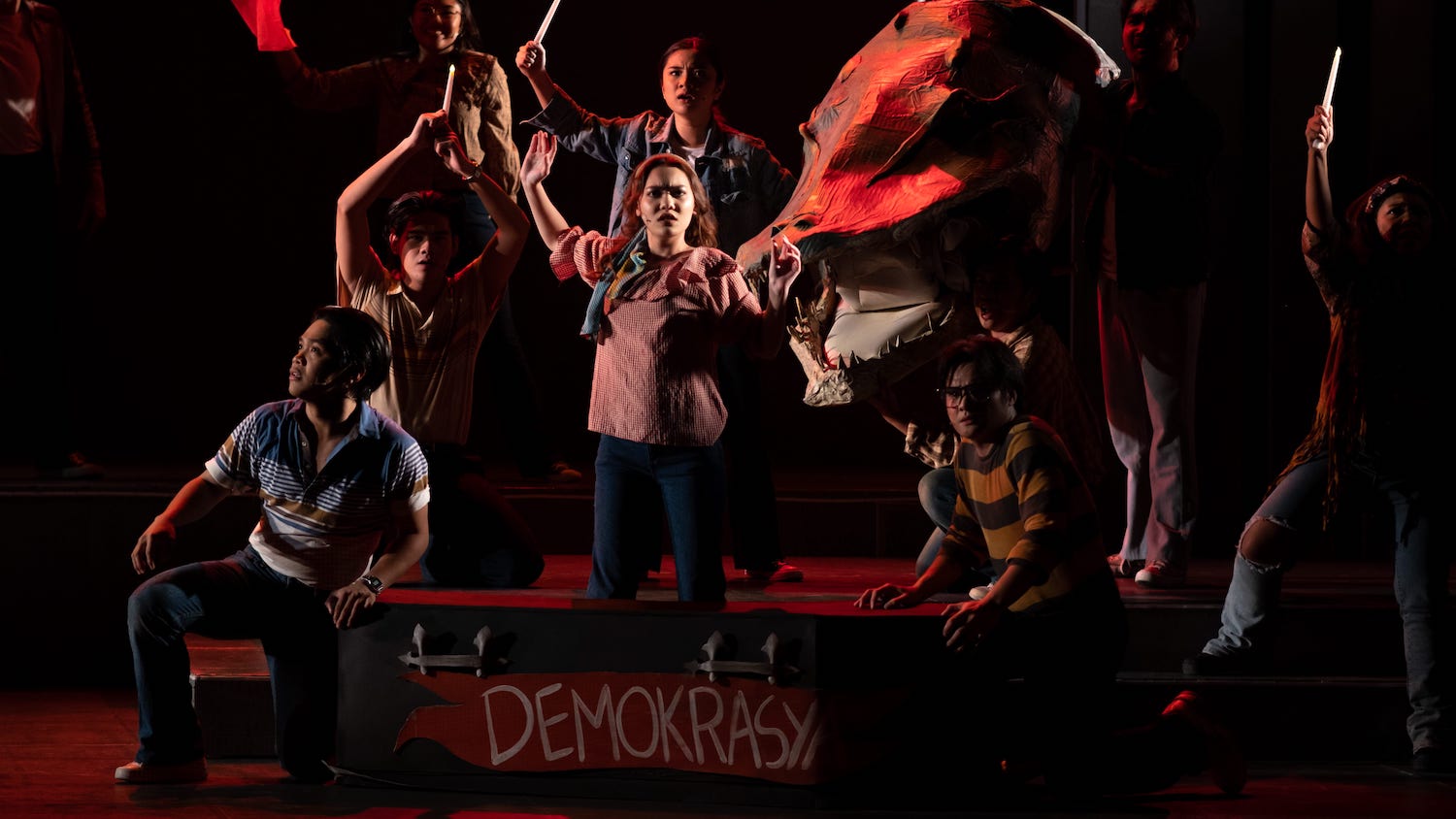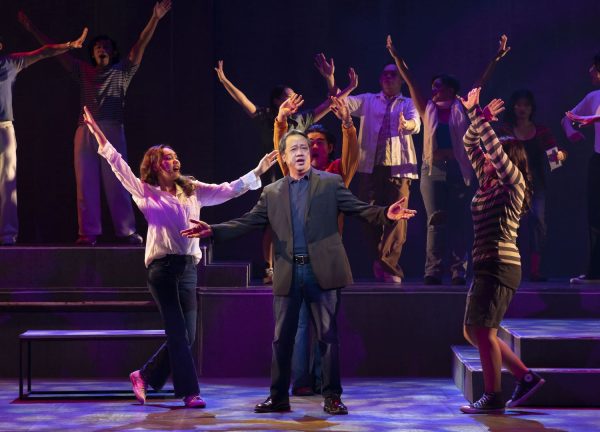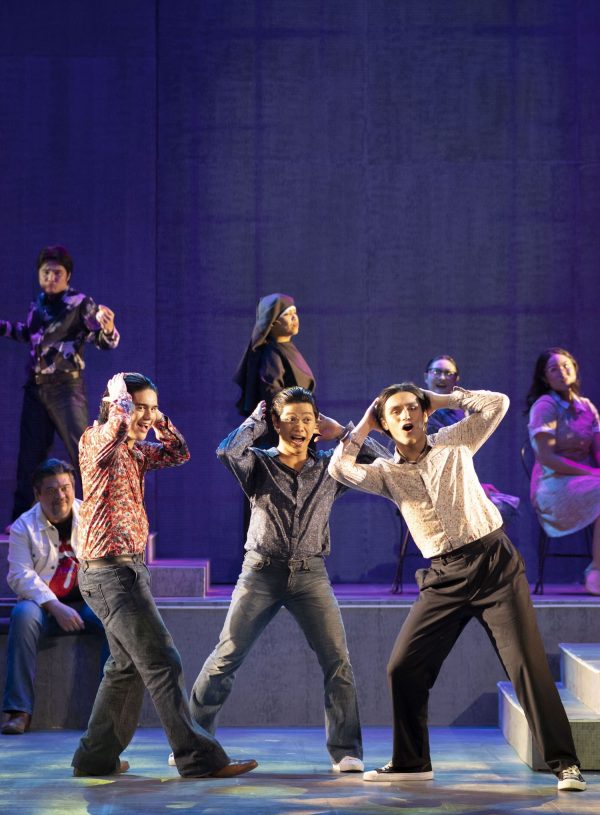
REVIEW: ‘Silver Lining Redux’ struggles to find its footing
In an ambitious attempt to bridge generational gaps and confront historical trauma, “Silver Lining Redux,” directed by Maribel Legarda and written by Joshua Lim So and Liza Magtoto, opens with three men–privileged boomers–who decide that a best offering for their high school homecoming and homage to a lost college mentor would be to mount a musical about their lives.
The premise alone immediately presents a challenge: asking audiences to invest in so-far unknown characters and jump right into following and caring about the interpersonal conflict that will very soon emerge. Redux, quickly unravels as a meandering exploration of memory, martial law, and millennial-boomer dynamics that never quite finds its center.
The narrative follows three high school friends (played by Jamie Wilson, Jake Macapagal, and Raul Montesa) who enlist their millennial children (Dippy Arceo, Johnnie Moran, and Don Anthony) to help stage a musical about their youth. What begins as a nostalgic look at their 1970s experiences – chasing “kolehiyalas”, attending school dances, and getting into “rambols” – evolves into a more politically charged piece about their awakening to activism during Marcos’ martial law, centered around the mysterious disappearance of a girl named Julia (played by Krystal Brimner in the show-within-a-show sequences).
Boomer v Millennial

Raul Montesa as Raul; Photo Credit: Ky Dela Peña
There’s also much ado about generational divides between the boomers and the millennials, but it is clear that the elders are front and center with the millennials mostly playing stereotypes overly invested in their parents’ ostensibly juicy pasts. There’s the flamboyant artist, the overzealous activist, and the quietly troubled soul that does little to serve the show’s apparent aim of exploring intergenerational understanding, particularly with Arceo’s portrayal veering into caricature of millennial activism.
The production struggles with the gamut of what it seems to want to tackle, show, and say. The first act meanders through feel-good 70s nostalgia and interpersonal drama, while the second act abruptly shifts into a more focused examination of martial law’s impact. This jarring transition, while eventually leading to a satisfying narrative payoff, creates what feels like two different shows competing for attention.
A large contributor to this struggle are central characters and the way they are unraveled in the show through scene after scene of melodramatic confrontations and mysterious allusions to past events to build intrigue without sufficiently showing the viewer who these men are or understand why their stories matter. The love story between Leo (Wilson’s character) and Julia, portrayed in flashbacks by Albert Silos and Brimner, lacks the emotional foundation needed to justify its narrative weight. While the young actress is a compelling presence, Julia seems to be more complex on paper than what Brimner was able to convey on stage.
Boy Meets Activism

L-R: Albert Silos as Young Leo, Jay Cortez as Young Raul, Drei Sugay as Young Anton; Photo Credit: Ky Dela Peña
The show’s political elements emerge belatedly, perhaps reflecting its protagonists’ circumstantial activism – they joined UP’s activist movement more out of something to do than conviction. While the second act’s exploration of martial law proves more compelling and sure-footed, it ultimately presents a somewhat superficial perspective that seems to say that even privileged young men were affected by the tumultuous times. While certainly potentially relatable, the show doesn’t explore the role of privilege in the narrative, and only really engages with it through a fish-out-of-water sequence where the privileged Anton interacts with the kind underprivileged who sheltered him and Julia while on the run from the cops.
The production never really overcomes the material’s limitations. The younger ensemble struggles to bring depth to their roles, while the veterans can’t fully compensate for their characters’ underdevelopment. Jack Teotico and Vince Lim’s music captures the disco-era atmosphere, though the songs themselves don’t leave a lasting impression.
Charles Yee’s set design, which at times has the cast playing against a blank backdrop, sometimes leaves the production (huge ensemble as it is) looking diminished on the vast stage. Tata Tuviera’s period-appropriate costumes effectively evoke the 1970s setting, providing one of the production’s more consistent elements.
Legarda’s staging occasionally creates confusion between memory sequences and the musical-within-a-musical scenes, making it challenging for audiences to track the narrative’s different layers. The large cast compounds this issue, with blocking that sometimes appears more focused on logistics than storytelling clarity. This confusion is particularly problematic given the show’s complex structure and time-jumping and musical-within-a-musical device.
Second Shot
“Silver Lining Redux”, renamed from last year’s “Silver Lining” is purportedly a changed version of its predecessor. As it stands, it seems to me that Redux–despite its eventual arrival at political commentary and a genuinely compelling plot twist–feels more like a second draft than a final product–and one that charges audience members up to 5k a ticket.
Tickets: P1200 – P5000
Show Dates: Nov 8–17 2024
Venue: Carlos P. Romulo Auditorium, RCBC Plaza. Makati
Running Time: approximately 2 hours and 30 mins (w/ 15 min intermission)
Creatives: Maribel Legarda (Director), Jack Teotico (Music and Lyrics), Joshua Lim So (Book and Additional Lyrics), Liza Magtoto (Book and Additional Lyrics), Vince Lim (Musical Director, Arranger, Additional Music & Lyrics, Sound Designer), PJ Rebullida (Choreographer), Charles Yee (Set Designer), Jethro Nibaten (Associate Lighting Designer), Arnold Jallores (Sound Engineer), Tata Tuviera (Costume Designer), Meliton Roxas (Lighting Designer), Joyce Garcia (Video Projection Designer)
Cast: Ricky Davao, Jamie Wilson, Raul Montesa, Jake Macapagal, Gina Respall, Don Anthony, Dippy Arceo, Johnnie Moran, Krystal Brimner, Albert Silos, Jay Cortez, Drei Sugay, Sara Sicam, Raflesia Bravo, Moi Gealogo, Nayr De Luna, Rodel Pingol II, Daniel wesley, Sam Marasigan, Misha Fabian, Nadia Tuviera
Company: Rockitwell Studio / MusicArtes Inc.


Comments